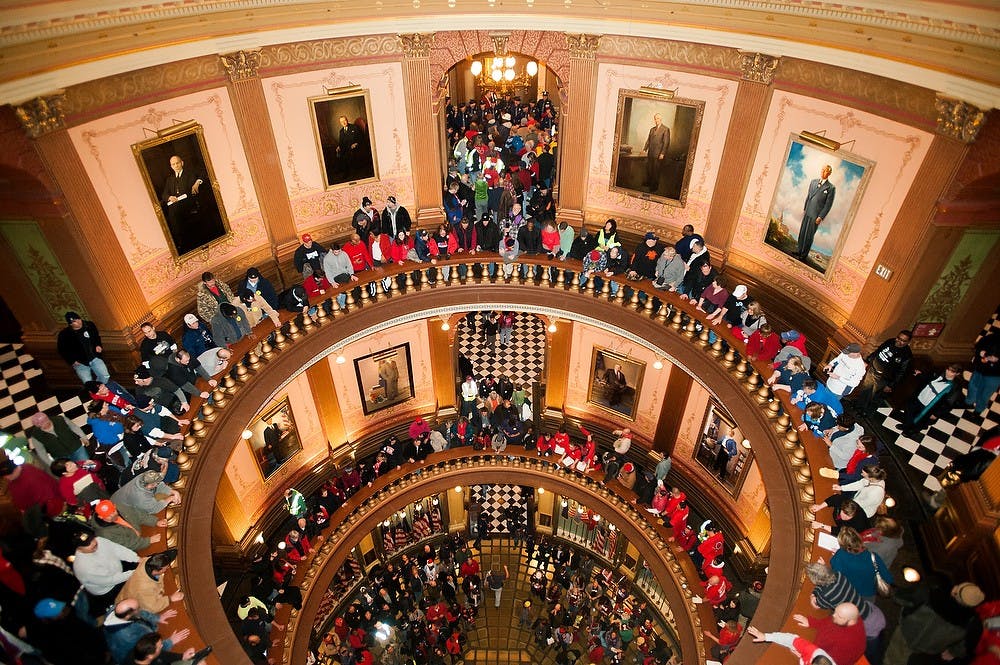Editor’s Note: A clarification – MSU professor John Beck does not believe a majority of Michigan
residents support the right-to-work bill.
Never underestimate the power of a cookie.

Hundreds gather at the rotunda, Tuesday, Dec. 11, 2012, at the state Capitol in Lansing. The building was opened at 7:30 a.m. Tuesday as thousands participated in the rally to protest right-to-work laws both inside and outside the building. Justin Wan/The State News
—Editor’s Note: A clarification – MSU professor John Beck does not believe a majority of Michigan
residents support the right-to-work bill.
Never underestimate the power of a cookie.
On Wednesday, the Michigan legislature’s first day in session after the winter break, politicians who did not support right-to-work legislation were greeted with freshly baked cookies. Politicians who supported the bill received a bag of cookie crumbs.
“The cookie crumbs (represented) how they’re crumbling the middle America,” said Lansing’s Sparrow Hospital nurse Kim Dennison, a member of the Michigan Nurses Association.
The demonstration was meant to remind lawmakers that Michigan workers haven’t forgotten about the controversial right-to-work bill passed in mid-December that will affect almost all public and private Michigan workers, including students in MSU’s Graduate Employees Union, or GEU.
On April 1, employee contracts no longer will include union security clauses, which require employees to join unions after working for a certain number of days. Workers under contracts including the union security clause will continue to pay dues until those contracts expire.
Unions usually collectively bargain with employers for benefits, such as better wages and vacation time. Employees with contracts created after April 1 will have the choice to opt out of unionizing.
John Beck, associate professor of human resources and labor relations, said he believes a majority of Michigan residents support the right-to-work bill. According to a poll of 600 Michiganders who actively vote in general elections, 47 percent of state residents favor right-to-work legislation and 46 percent oppose it. The poll was conducted by EPIC·MRA, a Lansing research firm, at the end of November.
Although he said most employers are ambivalent about the law, some worry right-to-work laws will create a riff between union and non-union members.
President of the Graduate Employees Union Dan Clark said unions are crucial at MSU and attract graduate students to the university.
Graduate students often teach substantial portions of an MSU class or grade most assignments. The GEU ensures graduate employees are not overloaded with work and available to help students.
“We want to give out the best educational experience to undergraduate students,” Clark said.
Dennison said she felt the bill was rushed through the Michigan Legislature in “a very undiplomatic process,” and did not give voters a voice. The bill was passed into law within days after it was introduced.
“We expect that they’re going to do better in 2013 and, if not, they’re going to be responsible for those choices,” she said.
Beck predicts within the next few years, lawmakers will refine some of the details of right-to-work legislation. In the meantime, Wednesday’s cookie protest might only be the beginning.
Support student media! Please consider donating to The State News and help fund the future of journalism.